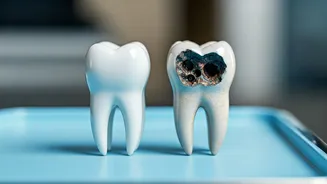Sugary Snacks' Impact
The consumption of sugary treats has a detrimental effect on dental health. These foods and snacks contribute to the formation of plaque, which is a sticky
film of bacteria that adheres to the teeth. When sugar interacts with the bacteria in plaque, it produces acids. These acids attack the tooth enamel, which is the hard, protective outer layer of the tooth. Over time, the acid attacks can lead to enamel erosion, making the teeth more vulnerable to cavities. Even seemingly innocent snacks can cause this damage, particularly if they are eaten frequently throughout the day. Frequent snacking provides a constant supply of sugar for the bacteria, extending the duration of acid attacks and increasing the risk of tooth decay. The best way to combat the negative effects of sugary snacks is to limit their consumption, brush your teeth after eating them, and consider alternatives that are less harmful to your teeth.
Aggressive Brushing Damage
While brushing your teeth is essential, the method you use can be equally important. Brushing too aggressively can damage the teeth and gums. Using excessive force can wear away the enamel, the protective layer on your teeth, leading to sensitivity and increasing the risk of cavities. Moreover, aggressive brushing can cause gum recession. Gum recession exposes the roots of the teeth, which are not protected by enamel and are therefore more susceptible to decay and sensitivity. This also makes the teeth appear longer and can lead to aesthetic concerns. To prevent these issues, it is recommended to brush gently, using a soft-bristled toothbrush and applying minimal pressure. Ensure that the toothbrush is angled correctly and the technique is effective, not forceful. A gentle, circular motion can be a very effective method to maintain good dental health.
Acidic Drinks' Effects
Many beverages commonly consumed, such as soda, fruit juices, and sports drinks, have high acidity levels. These acidic drinks can erode tooth enamel, making teeth vulnerable to decay and sensitivity. Acidic substances weaken the enamel, gradually dissolving its mineral content. This process, called demineralization, weakens the tooth structure and increases the risk of cavities. Frequent consumption of these drinks keeps the teeth exposed to acid, causing more significant and faster damage. It is important to be aware of the sugar content, as these drinks often contain a lot of sugar, which also contributes to tooth decay. To protect your teeth, it is advisable to limit your consumption of acidic beverages, or drink them in moderation. Rinsing your mouth with water after drinking an acidic beverage can help neutralize the acid and minimize its impact.
Teeth Grinding Risks
Teeth grinding, also known as bruxism, can be a serious threat to dental health. This condition involves clenching or grinding the teeth, often unconsciously, particularly during sleep. This action puts excessive pressure on the teeth, which can lead to a number of problems. The constant grinding can wear down the enamel over time, causing the teeth to become shorter, flatter, and more vulnerable to damage and decay. Furthermore, bruxism can cause or exacerbate temporomandibular joint (TMJ) disorders. TMJ disorders can lead to jaw pain, headaches, and difficulty opening or closing the mouth. Grinding may also lead to the loosening of teeth, causing them to shift position or even fall out. If you suspect that you grind your teeth, seeking professional help is highly recommended. Your dentist may recommend a custom-fitted mouth guard to protect the teeth during sleep and reduce the impact of grinding.
Tobacco Use Dangers
Tobacco use, including smoking and chewing tobacco, has severe effects on oral health, and is linked to numerous dental problems. Tobacco use is a major cause of gum disease, which can lead to tooth loss. It weakens the immune system, making it more difficult for the body to fight off bacterial infections in the mouth, leading to inflammation and damage to the tissues that support the teeth. Moreover, smoking stains the teeth, giving them a yellow or brown appearance. Tobacco use also increases the risk of oral cancer. Smoking introduces harmful chemicals into the mouth, which can damage the cells and increase the chances of cancer development. The risk of developing oral cancer is significantly higher for smokers compared to non-smokers. Quitting tobacco use is essential for improving oral health, and can reduce the risk of gum disease, tooth loss, and oral cancer.













